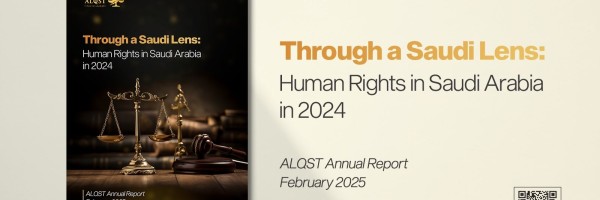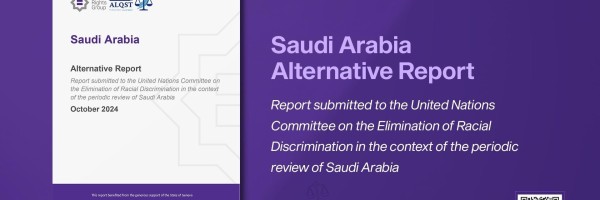Four human rights groups, ALQST for Human Rights, the Gulf Centre for Human Rights (GCHR), International Service for Human Rights (ISHR) and MENA Rights Group, have made a joint submission to the United Nations Committee against Torture (CAT), reiterating recommendations to hold Saudi Arabia accountable for the systematic practice of torture, including the torture and ill-treatment of women human rights defenders.
This joint report, submitted in March, addresses the recommendation mentioned in paragraph 20 of the Committee’s concluding observations (CAT/C/SAU/CO/2) on reprisals against and harassment, intimidation and arrest of human rights defenders and journalists. The report is submitted pursuant to the Committee’s request for further clarification adopted by the Committee on 11 December 2018 and available at:
https://tbinternet.ohchr.org/Treaties/CAT/Shared%20Documents/SAU/INT_ CAT_FUL_SAU_33228_E.pdf
The report addresses the systematic practise of torture in Saudi Arabia, noting that:
“Torture is practiced systematically in Saudi Arabia to extract confessions during interrogations and through-out detention. While detainees have reported informing courts of the torture they have endured, investigations are virtually never conducted into their allegations and coerced confessions are routinely admitted as evidence against them. Techniques of torture and ill treatment typically used include, beatings, flogging, electric shocks, sleep deprivation, solitary confinement, secret detention and threats of raping or killing victims’ relatives.”
It provides an update on the physical and psychological torture of Saudi women human rights defenders (WHRDs):
“Since November 2018, reports have emerged that women human rights defenders (WHRDs) are being systematically subjected to torture in Saudi Arabia. This is a particularly worrying development given that the torture of women detainees was previously unheard of in the state.”
It gives the reaction of the Saudi authorities to these reports:
“The Saudi authorities have refused all attempts to allow visits to the detained WHRDs by international independents bodies. This included an ad hoc panel consisting of UK MPs who had “sought access to eight jailed women to assess their welfare but received no response from the Saudi ambassador Prince Mohammed bin Nawwaf bin Abdulaziz.”
And the report gives an update on the situation of the individuals mentioned in the CAT letter, including: Abdulkareem al-Khodr, Waleed Abu al-Khair, Omar al-Sa’id, Abdulaziz al-Shubaily, Mohammed Saleh al-Bajadi, Ra’if Badawi, Loujain al-Hathloul, Eman al-Nafjan & Aziza al-Yousef, Samar Badawi, Nassima al-Sada and Mohammad al-Rabe’a & Ibrahim al-Modaimeegh.
Finally, it gives an assessment of the State Party’s compliance with the Committee’s recommendations, finding that: “In light of the information provided above, the authors strongly believe that the Committee ought to adopt a grade E, which is an appropriate reflection of the fact that “the State party adopted measures that are contrary or have results contrary to the recommendations of the Committee”.
The report is available to download here.




